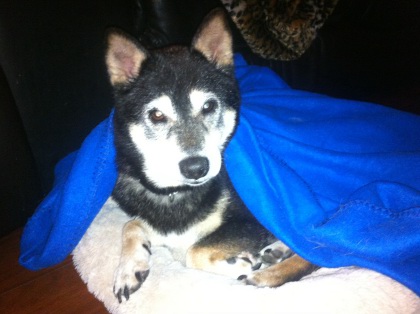About The Shiba Inu
If you have navigated your way to this page you are probably asking yourself “What is a Shiba Inu?”! Shiba translated means “brushwood” and Inu means “dog” in Japanese. When I first heard of the breed, only a few years ago, I had no idea about them; I didn’t know they even existed as a breed. My boyfriend and I had decided we wanted a dog and I had him researching breeds to see if we could find something different. After checking out various breeds he came across the Shiba Inu. Independent, stubborn, aloof, reserved, loyal, catlike, UNIQUE, loyal, challenging, did I say stubborn? Exactly what we were looking for in a dog!
The Shiba Inu is a part of the AKC’s Non-sporting group and has a breed standard size of 13.5 to 16.5 inches tall at the shoulders and 17-23 lbs. From speaking with other Shiba Inu owners, the sizes – especially for rescued Shibas – can vary from smaller than the standard to larger than the standard. The standard colors are red, sesame, and black and tan. They do come in a cream color as well, but it is not recognized by the AKC.
Once trained, the Shiba Inu makes a very agreeable and docile companion, although still maintaining the wolf-like traits of being fiercly protective while being a touch unpredictable. The Shiba loves to burrow thru thick grass hunting for bugs and small animals as they have a very high prey drive. According to National Geographic, the Shiba Inu is the domesticate dog breed that is closest to the wolf, genetically. (More information on National Geographic’s site.)
The Shiba Inu loves to run in the yard but also loves to go for walks. They need quite a bit of exercise as they are full of energy! So long as they get adequate exercise, they do quite well in apartments because of their small size and clean nature. They are to be kept in a securely fenced area or on a leash AT ALL TIMES. This is because of their high prey drive; they can start to chase something and will be in the next zipcode before they realize they are lost.
The Shiba Inu is a very clean dog and most I have found do not like water (this is where the catlike description comes from I am sure) They are easy to house train and learn basic commands very quickly. They do bore quickly of repetitive training however and must be kept interested if you wish for them to continue learning.
For more information on the breed, visit these links:
- National Shiba Club of America’s “About the Shiba” page
- The Shiba Inu Forum
